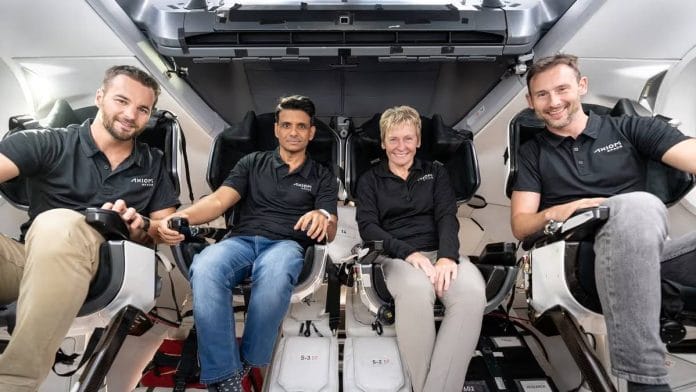New Delhi: From studying muscle regeneration to space farming and growth patterns of microalgae, at least seven Indian research institutes will send microgravity experiments on board the upcoming international Axiom-4 Mission. It’s set for lift-off from Kennedy Space Center, Florida, in May with Indian astronaut-designate Shubhanshu Shukla as crew member.
“The field of microgravity research with potential applications in diverse areas such as human health, physical and life sciences, material research, novel pharmaceutical development and biotechnology offers significant opportunities to the national scientific community,” the Indian Space Research Organisation (ISRO) said in a statement Monday.
Senior ISRO officials confirmed that seven microgravity experiments, from various research labs across the country, have been shortlisted to be sent on the Axiom-4.
Indian Air Force Group Captain Shukla will lead these experiments on India’s behalf.
The experiments
One of the primary experiments on the mission is being collectively carried out by the International Centre for Genetic Engineering and Biotechnology (ICGEB) and National Institute of Plant Genome Research (NIPGR), under the government’s Department of Biotechnology (DBT).
The experiment will study the impact of microgravity radiation on edible microalgae at the International Space Station (ISS).
A senior scientist from DBT said microalgae are the perfect specimen of microorganisms for undertaking space studies during long flights because of their ability to grow food sustainably.
The experiment will assess how space conditions impact the growth patterns and genetic activity of the samples. It will also study whether these microorganisms can be a potential option for space food in future missions.
The ICGEB has also designed another experiment to study cyanobacteria’s comparative growth and proteomics (study of all proteins expressed by a genome) responses when using urea versus nitrate in microgravity.
Another significant experiment around developing nutrition options for prolonged space missions is by the University of Agricultural Sciences in Dharwad. In this, scientists will investigate the sprouting of salad seeds in space.
Bengaluru’s Indian Institute of Science (IISc), which has been spearheading India’s space experiments, has developed two unique tests—one, to analyse human interactions with electronic displays in microgravity and the other to study the growth and survival of microscopic animals or microfauna, and eutardigrade paramacrobiotus or water bears.
Along with this, the Indian Institute of Space Science and Technology (IIST) and the College of Agriculture, Kerala Agricultural University, will send samples on board the mission to study the impact of microgravity on growth and yield parameters in food crop seeds.
The Institute of Stem Cell Science and Regenerative Medicine plans to study the effect of metabolic supplements on muscle regeneration under microgravity.
The Axiom mission
Last year, ISRO’s Human Space Flight Centre had entered into a Space Flight Agreement with the US’ National Aeronautics and Space Administration (NASA)-identified service provider Axiom Space for its upcoming Axiom-4 Mission to the ISS.
For the 14-day mission, pilot Shukla will be accompanied by Peggy Whitson of the US—the mission commander—and Poland’s Slawosz Uznanski and Hungary’s Tibor Kapu, the mission specialists.
The space agency said the mission will “realise the return” to human spaceflight for India, Poland and Hungary, with each nation’s first government-sponsored flight in more than 40 years.
“While Ax-4 marks these countries’ second human spaceflight mission in history, it will be the first time all three nations will execute a mission on board the International Space Station,” Axiom said in its mission statement.
This means that while Shukla will be the second Indian to fly into space after Rakesh Sharma in 1984, he will create history by becoming the first to fly to the ISS.
“This historic mission underscores how Axiom Space is redefining the pathway to low-Earth orbit and elevating national space programmes globally,” the Axiom statement added.
(Edited by Nida Fatima Siddiqui)
Also Read: Why does Gaganyaan crew have no women? History shows India has no excuses






